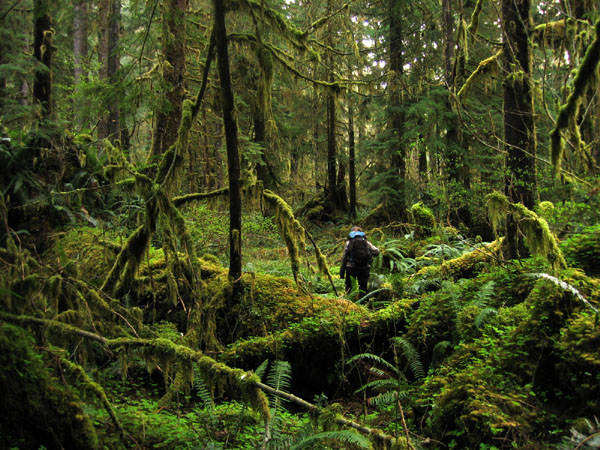
Photo courtesy Erin McKittrick, Wikimedia Commons
The practice of reducing forest fuels to lessen the chances of catastrophic fire undercuts a more vital service performed by old woodlands: the sequestration of carbon to offset global warming.
According to a new study in Ecological Applications, even if forestry biofuels were used in an optimal manner to produce electricity or make cellulosic ethanol there would still be a net loss of carbon sequestration in the forests of the Pacific Northwest for at least 100 years—and probably much longer.
Here’s what the study found: In a Coast Range forest, if you remove solid woody biofuels to reduce fire risks and then use them for fuel, you need 169 years before you reach a break-even point in carbon sequestration. If you use the same woody materials for the inefficient production of cellulosic ethanol, you need 339 years to break even.
Prior to this study, it was widely believed that using biofuels to produce energy would offset the carbon emissions from this process. But these data negate that hypothesis.
Instead, the authors conclude, we should forego fuel reduction treatments to enable forest ecosystems to provide maximal amelioration of atmospheric CO2 over the next 100 years.
The hypothetical benefits of fuel reduction went up in flames when the fossil fuel costs of transportation, fuel for thinning, and other energy expenditures, was factored in. With those calculations, forestry biofuels recovered only 60 to 65 percent of the energy they cost. Producing cellulosic ethanol recovered as little as 35 percent.
The bottom line: Transforming old existing forests into anything other than old existing forests produces a net loss in carbon sequestration.
Interesting note: Another study recently concluded that the forests of Oregon and northern California, if managed exclusively for carbon sequestration, could double or even triple the amount of sequestration in many areas.
Not considered in this study: How global warming might affect the increase of catastrophic fire. However, the authors write that fire severity in many forests may be more a function of severe weather rather than fuel accumulation. Therefore fuel reduction efforts may be of only limited effectiveness, even in a hotter future.
So what’ll it be—more fuel or a more stable world?









